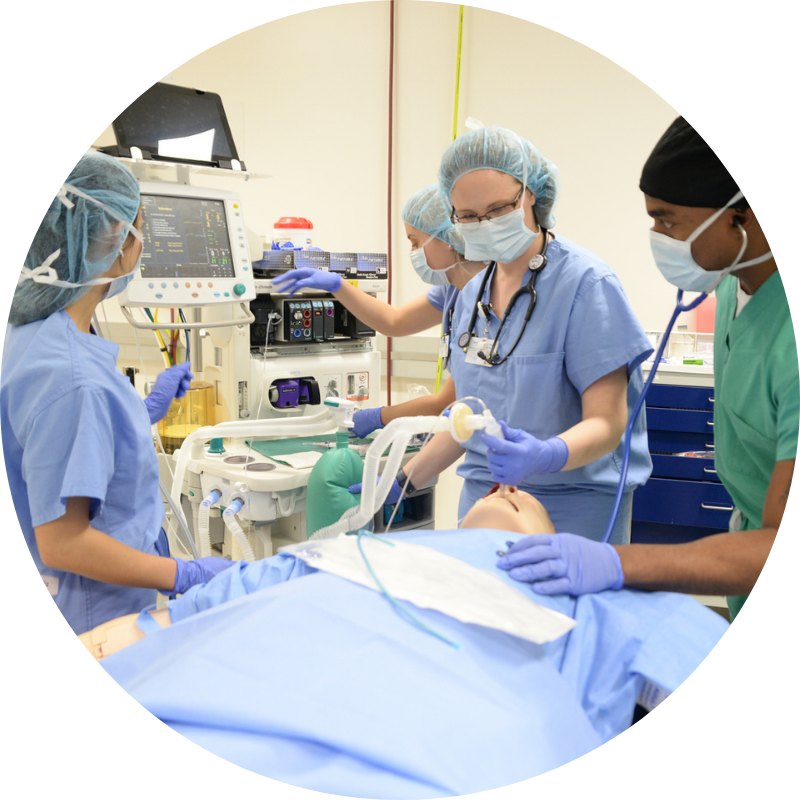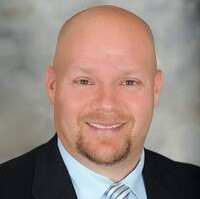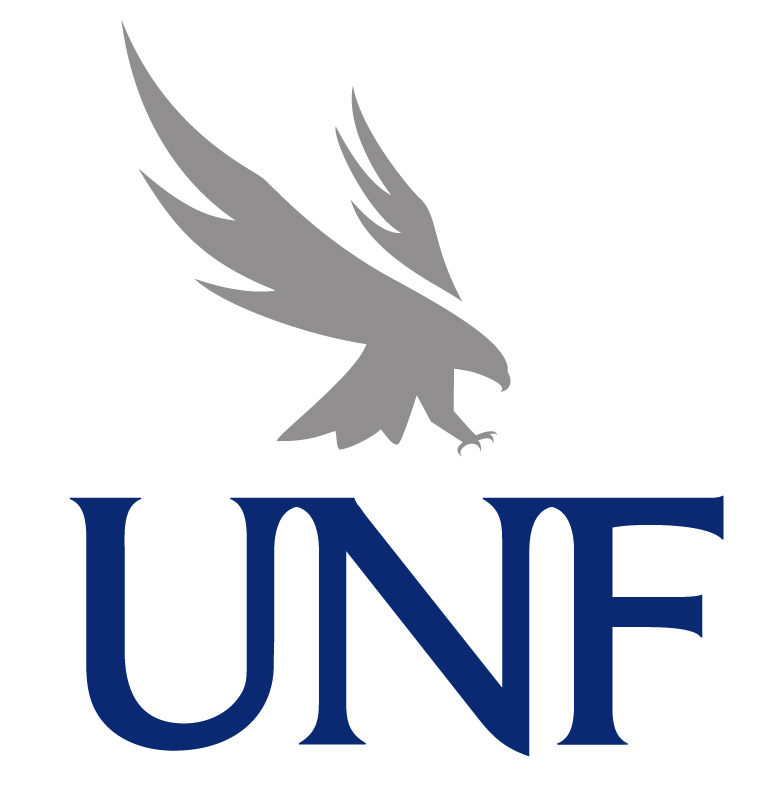Anesthesiology Nursing (DNP)
Empower Lives: Shape Your Career with Anesthesiology at UNF
Nurse Anesthesiology is a clinical specialty track within the School of Nursing at the University of North Florida (UNF). The School of Nursing has several innovative advanced practice specialty areas. With over 16,000 students, UNF is a major component of the State University System of Florida. UNF houses an extensive number of academic programs, including 30 programs at the masters and doctoral levels.
The Nurse Anesthesiology curriculum is an extremely rigorous academic and clinical undertaking. It consists of a nine (9) semester continuous program of full-time graduate study. The curriculum for the program is based on the American Association of Colleges of Nursing (AACN) Essentials for Doctoral Education for Advanced Practice (2006) and the accreditation standards of the Council on Accreditation of Nurse Anesthesia Educational Programs (COA).

About the Profession

There are nearly 50,000 Certified Registered Nurse Anesthetists (CRNAs) in the nation today. They administer over 65% of the anesthesia in the United States. In some rural states, that percentage is significantly higher. They are licensed in all states and serve as commissioned officers in all branches of the military as well as the United States Public Health Service. Studies conducted by the federal government have detailed the need for many more CRNAs in the U.S. today. Our nation has a significant shortfall of these invaluable Nurse Specialists. The administration of anesthesia by nurses is not a new development in health care. They have a long and distinguished history. Nurses were first specialists in the administration of anesthesia and their history dates to the 1800s.
The first organized program to teach the administration of anesthesia was not founded until the early 20th century. In 1915, chief nurse anesthetist Agatha Hodgins established the Lakeside Hospital School of Anesthesia in Cleveland, Ohio. This program was open to graduate nurses, physicians, and dentists. The training was six months, and the tuition was $50.00. A diploma was awarded on completion. In its first year, the program graduated six physicians, two dentists, and 11 nurses. Later, in 1918, it established a system of clinical affiliations with other Cleveland hospitals. The only post-graduate training just for physicians in circa 1920 was a one-month course in Ohio conducted by E. I. McKesson. Obviously, many factors have changed since then and the number of anesthesia specialists, both physicians and nurses, has increased. The length and cost of programs has also increased.

Application Deadlines
Spring 2027 Term . . . . . . NursingCAS & UNF supplemental applications available on Aug. 22, 2025; Deadline Feb. 1, 2026 for NursingCAS submissions; Deadline Feb. 16, 2026 for UNF supplemental application & official GRE scores (see Admissions for more details regarding the supplemental application)
Admission Requirements
For admission requirements and information on how to apply, please visit the nursing admissions area or
Program Information
-
What to Expect
Graduate education, and Nurse Anesthesiology education in particular, is a major undertaking: academically, professionally, emotionally, and financially. Classroom, clinical time, and study time average around 60 hours per week. As such, this is a full-time graduate program and outside employment is not realistic and not consistent with the demands and expectations of such a program. Applicants are strongly encouraged to research all aspects of this undertaking carefully. You are highly encouraged to speak with practicing CRNAs and Anesthesiologists, current Nurse Anesthetist Residents, or faculty to observe and/or discuss the practice of modern anesthesia care. With respect to financial planning, applicants are strongly encouraged to have a financial plan in place, as well as a back up plan, prior to making application to the program. -
Course Descriptions
For course descriptions and course searches please view the UNF Course Catalog.
-
Accreditation
The baccalaureate degree program in nursing, master's degree program in nursing, and Doctor of Nursing Practice program, and the post-graduate APRN certificate program at University of North Florida are accredited by the Commission on Collegiate Nursing Education, 655 K Street NW, Suite 750, Washington, DC 20001, (202) 887-6791.
The UNF Nurse Anesthesiology Program is accredited by the Council on Accreditation (COA) of Nurse Anesthesia Education Programs, which may be reached at 10275 W. Higgins Rd., Suite 906, Rosemont, IL 60018-5603 or at (224) 275-9130.
The University of North Florida is accredited by the Southern Association of Colleges and Schools Commission on Colleges to award baccalaureate, masters, and doctorate degrees. Contact the Commission on Colleges at 1866 Southern Lane, Decatur, GA 30033-4097 or call (404) 679-4500 for questions about the accreditation of the University of North Florida.
Individual contact to the Commission on Colleges about the University of North Florida accreditation status should occur only if there is evidence that appears to support significant noncompliance with a requirement or standard.
-
Performance Outcomes
Performance outcomes reported for the UNF Doctor of Nursing Practice Anesthesiology Nursing track's graduating class for December 2024: graduation rate was 100%; attrition rate was 4%; employment rate was 100% within six (6) months of graduation; COA pass rates for the 2024 graduating cohort were 100% with Method 1.
-
Graduate Academic Learning Compact
Visit the Office of Institutional Effectiveness website to view the Nursing Graduate Academic Learning Compact. -
Estimated Cost of Attendance
This program is one of several university-based CRNA programs in Florida. The total amount for tuition and fees for the entire program can be found on the Estimated Cost of Attendance page. These amounts are subject to change. Clinical sites include both in-state and out-of-state experiences. Sites provide experiences with unique opportunities to enhance students' skills, knowledge, and experiences. In addition to classroom and clinical forums, training utilizing SimMan simulator environments for anesthesia scenario training and airway management are incorporated into the training regimen. -
Important Dates
We encourage all students to view the important dates website.
-
Technology Requirements
Visit UNF ITS for Technology Requirements. -
Title IX
The University of North Florida does not discriminate on the basis of sex in the University’s educational programs and activities, and the University is required by Title IX and its implementing federal regulations to not discriminate on that basis. The requirement not to discriminate also extends to admissions and employment. Inquiries about the application of Title IX and its implementing federal regulations may referred to the University’s Title IX Coordinator, the Assistant Secretary for Civil Rights for the U.S. Department of Education, or both. UNF’s Title IX Coordinator may be contacted at 1 UNF Drive, Building 1, Suite 1200, Jacksonville, FL 32224, otcr@unf.edu, 904-620-2507.
Resources
-
Clinical Sites
Clinical Sites
Mayo Clinic (Jacksonville)
Halifax Medical Center (Daytona Beach)
University of Florida/UF Health Jacksonville Medical Center
Ascension, St Vincent's Medical Center (Jacksonville)
Flagler Hospital (St. Augustine)
Habersham Medical Center (Demorest, GA)
Memorial Hospital (Jacksonville)
HCA Florida Ocala Hospital (Ocala Health)
North Florida Regional Medical Center (Gainesville)
Southpoint Surgery Center (Jacksonville)
Baptist LaGrange Medical Center (LaGrange, KY)
Orlando Regional Medical Center (Orlando, FL)
-
NAP Computer Requirements
Computer Information
A successful student must be well-versed at using a personal computer to compose papers, take notes, create presentations (using Keynote or PowerPoint), research using the internet, download and save files. You must also be able to access high-speed internet. In the Jacksonville area, several service providers offer adequate options. While the UNF NAP is not in the business of promoting a particular brand of computer, here are a few guidelines:
PC laptops - For the sake of simplicity, any laptop with a modern Windows install, the MAXIMUM amount of RAM, and a wireless (WiFi) card will function adequately on campus and for the duration of the program. Make sure to purchase a copy of Office 365 or access to Google Docs, antivirus software, and anti-spyware software. We have had some students used Windows tablets and Surface Pros. As long as they meet the requirements, you can try to use one. Our advice is to use what is commonly used and what you are used to (e.g., modern Windows or Mac laptop). You will have enough on your plate as it is without trying to figure out your way around a new operating platform.
Apple Laptops - Any Apple purchased within the last two (2) years with an equivalent modern MacOS is acceptable. It is recommended that you configure it with the most RAM you can afford. While it is possible to use an iPad, it will be more challenging. One can certainly use a tablet as an augmentation to class participation and studies. You will need access to Office 365, Google Docs, or may use Pages, Keynote, and Numbers as long as you are proficient in converting documents to alternate formats when necessary for collaboration.
Software Requirements
No matter what computer you decide to get, have it properly configured for your word processing, spreadsheet, and presentation software. Software should include Adobe Reader to view PDFs as well as the latest version of Firefox, Safari, Chrome, and backup software. It is not your professor's responsibility to figure out why your wireless card is not working or why your computer keeps freezing, so ensure you have a solid understanding of how to join wireless networks and basic troubleshooting. All other needs must be directed through UNF Information Technology Services (ITS) Help Desk resources
Making Backups
The academic rigors of the program are stressful enough; do not try to make life harder by waking up one morning to discover your hard drive does not work anymore. Purchase a sizeable external HD and incremental backup software that will enable you to get back on your feet quickly should the worst happen. You need to focus 100% of your efforts on learning anesthesia, not reconstructing your lost notes and presentations.
TVC Client Download
You will need to coordinate with the Televideo Presence engineer to obtain our current version of TVC software for times when you may need to connect remotely.
IT Support
-
Nurse Anesthesiology Resources
Nurse Anesthesiology Resources
Organization Sites
American Association of Nurse Anesthetists (AANA)
American Association of Nurse Anesthetists (AANA), For Students
Florida Association of Nurse Anesthetists (FANA)
Topical Sites
Abbott Laboratories AnesthesiaWeb
Pharmacology
-
NAP Policies
Policies & Procedures
The Administrative Policies & Procedures Manual is designed to reflect the Standards for Accreditation of Nurse Anesthesia Educational Programs (Revised 2019) and to meet the needs of program administrators, faculty and students. The manual is divided into two components: (1) policies/procedures related to administration and faculty; and (2) policies/procedures related to curriculum and students. To obtain a copy of the Administrative Policies & Procedures Manual, please contact Dr. Ryan Shores.
Additional Technical Admission & Retention Standards
Admission into this program requires students to function in a clinical setting performing the customary duties of a Certified Registered Nurse Anesthetist. Accordingly, the skills and abilities that applicants and students must possess and safely and successfully demonstrate include, but may not be limited to, those described in the observation, communication, motor, intellectual, and behavioral and social attributes categories as described below.
Observation: Candidates must have sufficient sensory capacity to observe in the lecture hall, the laboratory, the outpatient setting, and the patient's bedside. Sensory skills adequate to perform a physical examination are required. Functional vision, hearing and tactile sensation must be adequate to observe a patient's condition and to elicit information from computerized monitors, and through procedures regularly required in a physical examination, such as inspection, auscultation and palpation.
Communication: Candidates must be able to communicate effectively in both academic and health care settings. Candidates must show evidence of effective written and verbal communication skills, and the ability to work in teams.
Motor: The ability to participate in basic diagnostic and therapeutic maneuvers and procedures (e.g. palpation, auscultation, drawing blood or starting intravenous lines) is required. Candidates must have sufficient motor function to execute movements reasonably required to provide care to patients, including the ability to help move or lift them. Candidates must be able to negotiate patient care environments and must be able to move between settings, such as clinic, classroom building, and hospital. Physical stamina sufficient to complete the rigorous course of didactic and clinical study is required. Long periods of sitting, standing, or moving are required in classroom, laboratory, and clinical experiences.
Intellectual: Candidates must be able to measure, calculate, reason, analyze and synthesize, both in quiet environments and in areas where distractions, noise, and other stressors are present. Problem solving, one of the critical skills demanded of CRNAs, requires all of these intellectual abilities. In addition, candidates should be able to comprehend graphics displays of physiologic data, distinguish artifact on monitor displays, and understand three-dimensional relationships and the spatial relationships of structures. Candidates must be able to read and understand medical and nursing literature. In order to complete the degree, candidates must be able to demonstrate mastery of these skills and the ability to use them together in a timely and often critical fashion in problem-solving and patient care.
Behavioral and social attributes: Candidates must possess the emotional health required for full utilization of their intellectual abilities, the exercise of good judgment, and the prompt completion of all academic and patient care responsibilities. The development of mature, sensitive and effective relationships with patients and other members of the health care team are essential. The ability to effectively function in the face of uncertainties inherent in clinical practice, flexibility, compassion, integrity, motivation, interpersonal skills, and concern for others are all required. Candidates must be willing and able to follow program and practice guidelines. They must practice ethically and within legal and regulatory authority.
-
Nursing Anesthesiology Faculty
Meet the Nursing Anesthesiology Faculty 
Ryan Shores
Director, Nurse Anesthesia | Assistant Professor
Office: 39A/3097
Phone: (904) 620-1848
Email: ryan.shores@unf.edu
Katherine Meuti
Assistant Director, Nurse Anesthesia | Assistant Professor
Office: 4/2403
Phone: (904) 620-1822
Email: katherine.meuti@unf.edu
John McDonough
Coordinator for International Experience | Founding Professor
Office: 4/2405
Phone: (904) 620-1422
Email: john.mcdonough@unf.edu
Amy Suralis
Clinical Assistant Professor
Phone: (904) 620-2684
Email: n01174707@unf.edu
Jonathan Pabalate
Instructor
Phone: (904) 620-2346
Email: n01174707@unf.edu
Carol Roland
Assistant Professor
Phone: (904) 620-2684
Email: carol.roland@unf.edu
Elizabeth McCarthy
Professor
Phone: (904) 620-2684
Email: jane.mccarthy@unf.edu
Contact Us
NAP Admissions
Dr. Beth A. Dibble
Give
Anesthesiology Directed Development Fund
Community partners, alumni and friends who believe in advancing patient safety, clinical excellence and hands-on training for future anesthesia professionals should give to the Anesthesiology Directed Development Fund at UNF.


